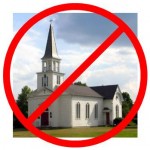He who has been forgiven much, the same loves much
I haven’t done a “Comment Highlight” post lately, but Art left a comment yesterday that has to be given a wider audience.
Art left the comment on my post “God actually cares about THOSE people: lessons from Jonah and Mark” and is a reply to a question that I asked him in a previous comment: “Why do you think we tend to cling to God’s goodness and graciousness when it pertains to ourselves… but not necessarily to others? (Like toward THOSE people?)”
This is how Art answered my question:
We can’t offer what we haven’t received.
There is the story of the old minister on his deathbed. He had been a faithful servant many long years. In attendance was a young minister, who, in trying to comfort the old man, suggested, “Pastor, you are going home to well deserved reward.” The old pastor sighed, and whispered, “No, pastor, I am going home accepted in the arms of grace undeserved.”
I think most of us never really let go of the notion we have to earn God’s grace, and be worthy of God’s grace to maintain it. So, we listen intently to grace as it pertains to us. We are keenly interested in it. We even long for it. Some of us work very hard to be worthy and make all sorts of sacrifices.
But, in the end, we cannot curl up in Him against Him with our head fully resting on His arm. We have not been captured by grace: freed from performance we can never meet and from the exhausting efforts of maintaining self-deceptions that we do measure up (when we know within we do not).
Rather than extending grace to THOSE people, we extend judgement, needing to be better than them in the hopes it will be enough for God and bitter that such should be extended grace when we have worked so hard and have not received it yet ourselves.
Imagine how kind, how forbearing, how gentle, how gracious we might be if we were truly “rooted and grounded in love, comprehending with all saints what is the breadth, and length, and depth, and height; And to know the love of Christ, which passeth knowledge,” completely accepted and forgiven for all the evil that we do and that lies within our hearts? We would be “filled with all the fulness of God.”
“He who has been forgiven much, the same loveth much.”
Replay: Blurring the distinctions between “local” and “universal”
Five years ago, I wrote a post called “Blurring the distinctions.” The purpose of that post is to show that the distinctions that we often make between “local church” and “universal church” are not as easy to find in Scripture. In fact, when Paul is writing about the church, he often uses terms and descriptions that alternate back and forth between what we would often call “local church” and “universal church.”
So, why is this important? Well, if the authors of Scripture do not make a distinction between “local church” and “universal church,” then perhaps we should not make that distinction either.
———————————-
John S. Hammett is a wonderful professor. He not only allows for discussion, he also encourages it. He has written a book describing Baptist ecclesiology: Biblical Foundations for Baptist Churches.
He begins his book by describing the biblical foundations of the nature of the church. He states, “Local and universal is the most widely used terminology for the twofold meaning for ekklesia found in the New Testament.” In fact, his discussion of the church hinges on the local and universal distinctions that he finds throughout Scripture.
For example, when discussing the “Body of Christ” as an image of the church, he says, “Interestingly, the use made of the body image in Romans and 1 Corinthians differs markedly from the use in Ephesians and Colossians, so much so that they need to be examined separately. In Romans and 1 Corinthians, the body of Christ is a metaphor for the local church, and the emphasis is on the relationships the members of the body have with one another… [I]n Ehesians and Colossians, the body is related to the universal church.”
I do not think it is that simple. Instead, Scripture often blurs the distinctions between what we now call the “local church” and the “universal church.” I do not believe that these distinctions are scriptural. For example, Paul uses the body metaphor in three passages in Ephesians:
And he put all things under his feet and gave him as head over all things to the church, which is his body, the fullness of him who fills all in all. (Eph. 1:22-23 ESV)
There is one body and one Spirit- just as you were called to the one hope that belongs to your call- one Lord, one faith, one baptism, one God and Father of all, who is over all and through all and in all. (Eph. 4:4-6 ESV)
Rather, speaking the truth in love, we are to grow up in every way into him who is the head, into Christ, from whom the whole body, joined and held together by every joint with which it is equipped, when each part is working properly, makes the body grow so that it builds itself up in love. (Eph. 4:15-16 ESV)
The first two passages seem to align with our use of the term “universal church.” But, in the last passage, Paul is using very intimate language that seems to correspond with our use of the term “local church.” In other words, Paul has no problem blurring the distinctions between “local church” and “universal church.” Why? I don’t think Paul sees the same distinctions that we normally see.
The skinny on NOT planting churches
A few days ago, I linked to a post about starting churches among prisoners… yes, while they are still in prison.
Today, I am linking to a post that (from the title) seems to present the opposite point of view. In reality, I think the two perspectives are much closer than it may appear.
Andrew Jones, the “Tall Skinny Kiwi,” wrote the post called “9 reasons NOT to plant a church in 2012.” Now, I know what you’re thinking: how can a post about NOT planting churches be remotely related to a post about planting churches in a prison.
Well, you have to read Andrew’s post. But, for the moment, consider this snippet:
But now it’s 2012 and while some young, enthusiastic people are out there planting churches like its 1997, others are focusing on launching more sustainable, more holistic, more measurably transformational Kingdom solutions.
One of the biggest trends in church planting that I observed in my recent 30+ country trek is the SHIFT AWAY FROM planting churches towards NOT planting a church at all but focusing on a wider range of transforming Kingdom activities. Some church planters are delaying the worship service piece of the pioneer missional ministry for as long as possible and sometimes indefinitely.
You see, Andrew and Jim (the other author) are talking about very similar things. In other words, don’t “plant churches” in terms of creating some time of organizational structure attached to a denominational system. Instead, plant yourself and the gospel and a kingdom-mindset among a group of people.
Yeah, the “church” might look amazingly different from what you expect. But, so what?
What’s wrong with those young people?
Everybody is worried about the teenagers and twenty-somethings, especially those who are growing up “in the church.” Why are they worried? Because they are not staying “in the church.”
Survey after survey, poll after poll, count after count returns the same result and asks the same question: Young people are “leaving the church” and “Why?”
The latest article that I’ve read about this phenomenon is at “Out of Ur” and is called “The Religious Views of 20-Somethings, Part 1.” (Since this article is called “Part 1,” I would assume there will be a “Part 2” eventually.)
This study is slightly different in that it was written by World Religions professor and is based on essay questions written by his students. This is how he describes the exercises:
Last semester I assigned the students in the community college World Religions course I teach a series of writing exercises that (I hoped) would help them personalize and internalize the subject matter we were reading about and discussing in class. There were four assignments total, one every four weeks or so. And each was a little more probing. My goal was simply to get these students from diverse religious backgrounds thinking about their experience with religion, assumptions about religious claims, how they understand the role religion plays in their lives.
The author (professor) admits that this is not a scientific study, but I think the answers that his students left on the essay questions are extremely enlightening. There is one point that I think is especially interesting:
In the first assignment, the students wrote about their experience with religion from their earliest memories to the present. Interestingly, most of them had overwhelmingly positive experiences with religion as young children. Some of them expressed being bored or confused during services—temple, mosque, synagogue, or church. But none of them reported leaving the faith of their youth because they had a traumatic experience or because they ultimately disagreed with the community’s teaching. Rather, most of them just stopped going. One week they went; the next week they didn’t. Services didn’t make any real difference in their life.
Think about this last statement for a minute: “Services didn’t make any real difference in their life.”
Guess what? Religious services will never make any real difference in anyone’s life. Yes, for previous generations, there was importance attached to these religious services, whatever religion or tradition or background we may be talking about (Christian and nonChristian alike). However, it was not necessarily the “religion” of the service that caused it to be important. Instead, it was the community aspect.
The religious services of the previous generations were important because they were shared experiences of a local community, typically people who lived in the same vicinity as one another.
Not anymore. Today, people drive for 10, 20, 30 minutes… even longer… to attend religious services with people that they only see during those events. Now, people sit beside strangers to observe religious services. There is nothing special about them because the shared community aspect is gone.
So, what’s the answer? Well, according to most studies, the answer is to make the services “relevant.” In fact, the title of the paragraph that I quoted above is “Religion irrelevant.”
However, if you read the information closely, you’ll see that “religion” (or, spiritual beliefs, at least) is not irrelevant to these young people. They all have spiritual beliefs. In fact, for the most part, they did not report feeling hurt by religion or disagreeing with their religion.
Instead, according to this professor’s limited study, these young people “left the church” for one simple reason: “Services didn’t make any real difference in their life.”
Do you want to see young people (or older people for that matter) hang around and actually grow in their faith and spiritual beliefs? Then, start making a difference in their life. You can’t do that from a platform. You can’t do that from a lectern. You can’t do that from an office or from behind a desk.
If you want to make a difference in someone’s life, then you have to share your life with them and encourage them to share their lives with you. It takes real, intimate relationships. This is what previous generations had with the people who lived nearby (community). It’s what young people are not finding among the church today.
Trickle down effect doesn’t work among the church?
If you follow me on Facebook or Twitter, then you know that I link to several older posts each day. I’m encouraged when someone responds to these old posts or thanks me for them. I sometimes struggle with when to continue discussion on those old posts and when to let new comments stand.
Anyway, Arthur at “The Voice of One Crying Out in Suburbia” recently picked up on one of my older posts and used it as a jumping off point for his own new post “Ephesians 4:11. It is not all about you.”
As you might guess, Arthur’s post is about Ephesians 4:11, and the gifted individuals listed there: apostles, prophets, evangelists, and pastors and teachers.
This is part of what he says:
Focusing on just the “specially gifted” in the church with faith in a theological “trickle down effect” has proven catastrophic for centuries… Every person in the church has something to contribute and teach to others in the church, not just a few at “the top”…
[W]hen Ephesians 4:11 is read in context it is not about pastors or “leaders” at all. It is about the entire church, working together and edifying one another, becoming mature together.
Ah, yes, it does make a difference when we read Ephesians 4:11 in context, especially with Ephesians 4:16 – part of the same sentence.
Nope, the “trickle down” effect is not the way the God works through the church.
But, in one sense, Ephesians 4:11 IS about you. It is about how God has given YOU to the church so that he can work through YOU to build up his church and to help others carry out works of service.
What a difference it makes among the church and in the world when “each part is working properly”…
God actually cares about THOSE people: lessons from Jonah and Mark
As I’ve mentioned a few times, we ready the books of Jonah and Mark together as a church last Saturday, New Year’s Eve. Then, the next day, Sunday, New Year’s Day, we discussed these two books together.
When we read Jonah then immediately read the first few chapters of the Gospel of Mark (before taking a short break), I noticed something. When we discussed these two books, other people said that they noticed the same thing.
What did we notice? God actually cares about THOSE people!
What people am I talking about? You know what people I’m talking about. THOSE people. People who set themselves against God and his people. People who do not live the right way. People who follows the ways of the world instead of living for God.
God actually cares about THOSE people.
In Jonah, it’s the people of Nineveh. THOSE people were the enemies of Israel. Nineveh was the capital of the Assyrian empire, the very people who would invade Israel in only a few decades. They were pagans, setting themselves against God. And Jonah, the great prophet of God – a man of God – called by God – knew what kind of people these were. They deserved to be destroyed by God because of their wickedness.
But, God had mercy on THOSE people. He gave them the opportunity to repent, they did, and he spared them.
Then, in Mark, the Jewish leaders also recognized the difference between themselves – the holy men of God – and THOSE people. THOSE people were Gentiles, tax collectors, prostitutes, demon possessed, etc. They were stricken by God while the Pharisees and Sadducees and other religious leaders were blessed by God.
But, Jesus took care of THOSE people. He loved them. He touched them. He healed them. He talked with them.
Jesus even ate with THOSE people!
In fact, Jesus put THOSE people above keeping the Sabbath! He put the needs of THOSE people above the rules about devoting your resources to God, for heaven’s sake! What can be better than setting aside your money for God and the temple and the religious leaders (even if it might mean neglecting someone’s parents)?
At least Jonah and Mark were all stories from “back then.” Today, we know the kind of people that Jesus wants us to hang out with. And, he certainly doesn’t want us to spend time with THOSE people. (You know what kind of people I’m talking about.)
Today, God wants us to only hang around his people, people who belong to him, and who live for him (in the way that we think they should live for him).
Yes, I’m sure that God still cares about THOSE people, but he doesn’t expect me to care about them too… right?
Starting a Church… in a Prison?
I love this story by Jim at “Crossroad Junction” called “Planting Churches.” It’s all about how God used him (and is using him) to start a church in a prison.
He begins his post by telling about his plans to continue discipling some prisoners. But, then, God changed his plans, and he ended up challenging the prisoners to live as the church in their context, which is the prison, of course.
Jim concludes with these challenging words about new churches:
I’m not so sure why we make this so complicated.
Maybe it’s because we don’t trust that Jesus knew what He was doing when He instructed His disciples in Luke 10 on how to usher the Kingdom of God into new communities.
Maybe it’s because we don’t trust that God will bless those individuals of peace in that community, and then use them to attract others into His Kingdom.
Maybe it’s because we think it’s all up to us.
But nothing could be further from the truth. If anything, my role is very limited: I am to bless those whom God has pre-positioned as catalysts of peace and hospitality, gently encourage the emerging believers, and then get out of the way so they can come forth, minister one to another, and participate together in the joy of knowing Jesus.
Once that foundation is laid, the rest just sort of naturally follows.
Wow… if it’s really that simple, then that’s something that God could do through any of his children…
What do you think about Jim’s story? Is starting churches really as difficult (and does it really require as many resources) as we generally see today?
Teaching Workshop: Who Teaches?
Over the next few weeks, I’m planning to lead a “Teaching Workshop” for the church on Sunday mornings. We’ll work through a few passages of Scripture and discuss together what those passages say about teaching and teachers.
This is not a workshop about how to put together a teaching outline or how to study commentaries or other reference materials. Instead, we will discuss a broad and general view of teaching through Scripture. I hope that this workshop will be helpful for people teaching in any context.
This is the general outline that I plan to use for this workshop:
Part 1: Who Teaches?
Part 2: The Motivations of Teaching
Part 3: The Purpose and Methods of Teaching
Part 4: Teaching When the Church Gathers
For each week’s workshop, I plan to put together a short worksheet to guide our discussion. This is the worksheet for the first week’s session. This lesson will be called “Part 1: Who Teaches?”
Feel free to discuss or ask questions in the comments.
———————————————-
Teaching Workshop
Part 1: Who Teaches?
Note: To begin this workshop, I need to specify that I believe that all Scripture is in agreement when it comes to teaching. I will approach all passages as if they agree with one another.
I recommend reading the following passages so that you will know the context and background of the specific parts that we will discuss together. As you read, pay attention to the context as well as what the author says about teaching: Matthew 23:1-12, Matthew 28:16-20, Romans 12:1-8, Romans 15:14-21, 1 Corinthians 12:1-31, Ephesians 4:7-16, Colossians 3:12-17, 1 Timothy 3:1-7, Titus 1:5-9, Hebrews 5:11-6:3, James 3:1-18, 1 John 2:18-29.
I. The Ultimate Teacher
According to Scripture, there is one teacher for those who follow Jesus Christ. All of his disciples learn from him through the Holy Spirit. (Matthew 23:8, 1 John 2:27)
II. There is a Spiritual Gift of Teaching
Teaching is one of the ways that the Holy Spirit manifests himself in the life of a follower of Jesus Christ for the purpose of building up the church. (Romans 12:4-8, Ephesians 4:7-11)
III. Everyone Does Not Have the Spiritual Gift of Teaching
While the Holy Spirit gifts some with a special ability to teach, he does not give everyone this spiritual gift. (1 Corinthians 12:29-30)
IV. However, Everyone is Instructed to Teach and is Able to Teach
While only some have the spiritual gift of teaching, Scripture indicates that all who follow Jesus Christ should teach, and that teaching is an important aspect of the Great Commission. (Matthew 28:19-20, Romans 15:14, Colossians 3:16)
V. Those Gifted in Teaching Have the Added Responsibility of Helping Others Teach
When considering the passage below, think especially about how the “evangelist” equips the church for “works of service.” Then apply that to the other gifted individuals, including teachers. (Ephesians 4:11-13)
VI. What about Elders and Teaching?
Those recognized as elders should be able to teach, demonstrating previously that they are doing what all believers should be doing (i.e., teaching, in this case). (1 Timothy 3:2, Titus 1:9)
VII. Consider Seemingly Contradictory Passages about Teachers
How can these passages be in agreement? (Hebrews 5:12, James 3:1)
Some thought-provoking posts on the church to kick off the new year
Eric at “A Pilgrim’s Progress” has written some very interesting posts over the last few days. I think these are all good posts to help us kick off the new year. These three posts focus on the gospel, on the church, and on salvation.
For example, just before New Year’s Day, Eric wrote a post called “What Matters Most.” This is the post that focuses on the gospel.
He writes:
We all, myself certainly included, must remember that the gospel is a divider. It separates those who are Christ’s from those who are not. However, the wonderful thing is that this gospel is powerful enough to save any and all who repent and believe. And stunningly, our Savior has decided to use sinful us to be the heralds of this wonderful news.
In another post called “The Church Imprisoned,” Eric compares some Christian organizations to prisons. I think this is an important and useful discussion, because these types of organizational structures often bind believers from living as God desires (even if it happens inadvertently).
Like Eric says in the quote below, I also believe that many aspects of the church in the West needs to be reformed:
The church in the West is imprisoned by the above forms and structures. They stifle what the church is trying to accomplish. Let us pray that God will bring about a new reformation in his church in the West. Let’s hope that more and more of our brothers and sisters in Christ will throw off these fetters to live as the church we see in scripture.
Finally, in his post called “I’m Not Saved Because…,” which he published on New Year’s Eve, Eric reminds us that we are not saved because of what we do. Even having the “right” kind of ecclesiology does not save you.
Eric concludes:
I’m not saved because of anything I’ve done.
I’m not saved because of me.
I am saved because of the grace of God alone through the work of Jesus Christ on the cross alone.
Thank you for these reminders, Eric! I look forward to many more thought-provoking posts in 2012!
What do you think about Eric’s posts?
New Year’s Eve and New Year’s Day with the Church
Have you ever heard of a “Watchnight Service” where people read through the entire Bible on New Year’s Eve / New Year’s Day? Yeah? Well, we didn’t do that. (Now, I know there are other kinds of “Watchnight” services. But, that’s the kind I always heard about growing up.)
But, we did get together with the church on New Year’s Eve and New Year’s Day to read and discuss Scripture, among other things. (Actually, over the weekend we gathered together with the church several times besides the two instances that I described here. But, in this post, I’m going to focus on these two times of gathering.)
As I mentioned in my post “Reading Scripture Together with the Church on New Year’s Eve,” we gathered together on Saturday, New Year’s Eve, with some brothers and sisters to read through the books of Jonah and Mark.
We began gathering together just before 7:00 (7-ish) at the home of some of our friends, and, of course, we immediately began grazing on ham and cheese rolls, meatballs, raw vegetables, several flavors of popcorn, different cheeses, cookies, and other assorted “finger foods.” About half of the people present were brothers and sisters that we gather with weekly. However, there were a few friends and friends of friends who joined us well. A couple that we had never met even drove in from the Outer Banks (NC) to spend the weekend with us (you know who you are!), and we had a great time getting to know them!
Eventually, we started reading together. We read through the book of Jonah (4 chapters) and the first 4 chapters of Mark. Then we took a short 10-15 minutes break for food, stretching, etc. After the first break, we read Mark 5 through Mark 10 and took another short break. Finally, we read Mark 11 through Mark 16. Twenty-one different people read (two people split a chapter), including several children. We also read from different English translations.
We tried to refrain from discussing the Scriptures as we read them, but we found it terribly difficult! We ended up talking a little… but not much.
Then, on Sunday, New Year’s Day, we gathered for our normal weekly meeting. Of course, many of the people who gathered with us Sunday had been present when we read Jonah and Mark together. Others had not been with us when we read together New Year’s Eve.
But, we had decided to discuss the two books on Sunday. So, after singing a few songs – accompanied on guitar by a friend who spend the day with us before returning home to Virginia – we began talking about Jonah followed by a discussion of Mark.
I won’t go into what we discussed. It was extremely encouraging and challenging. I may write something about this later.
As a new friend said to me in an email:
Was Jesus there? Obviously! How do we know? Because the truth was there being spoken, taught, and discussed; because family was there sharing struggles and thanksgivings, and sorrow, bearng one anothers burdens; because the body was there speaking truth in love to build one another up.
This was a great way to spend New Year’s Eve and New Year’s Day.










